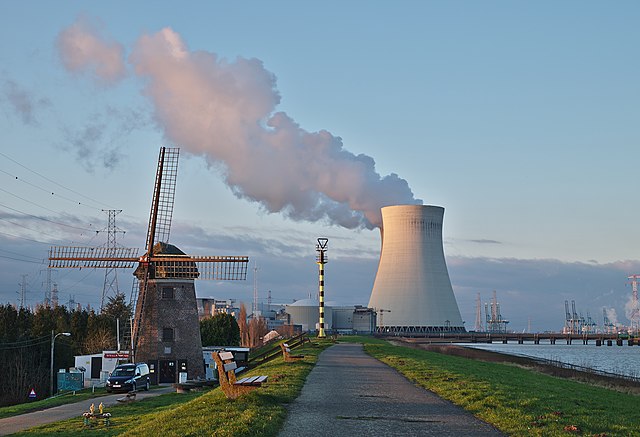The Doel nuclear power plant, in Belgium, during a time of operation. (Photo: Alexandre Jacquemin)
After 50 years of operation, Unit 1 at Belgium’s Doel nuclear power plant has been permanently shut down.
Just weeks ago, Belgian Prime Minister Bart de Wever talked about trying to keep Doel-1, which was retired on February 14, in operation. He faced an uphill battle, however, given the decades the nation has spent arguing about nuclear energy. In 2003, Belgium enacted a law banning construction of new nuclear reactors and calling for eventual decommissioning of existing reactors, Belga News Agency reported.
Present at the MOU signing ceremony were, from left, Joost van den Broek and Bertholt Leeftink of NRG Pallas, Belgian ambassador Anick van Calste, and Philippe Van Troeye and Denis Dumont of Tractebel. (Photo: Tractebel)
Belgium-based engineering firm Tractebel and the Netherlands’ NRG Pallas have signed a memorandum of understanding to provide engineering services in support of new reactor construction at the Borssele nuclear power plant, located near the village of Borssele in the Dutch province of Zeeland.
Belgium's Doel nuclear power plant. (Photo: N. Hippert/IAEA)
The Belgian government is exploring the idea of extending the operational life of its three oldest reactors by two years, a variety of news outlets are reporting.
Those reactors—Units 1 and 2 at the Doel facility and Unit 1 at Tihange, sporting a combined capacity of 1,852 MWe—were slated to be permanently shuttered in 2025 in keeping with the country’s nuclear phase-out policy.
The Tihange nuclear power plant. (Photo: Engie Electrabel)
Unit 2 at Tihange, one of Belgium’s two nuclear power plants, was permanently disconnected from the grid late on the evening (local time) of January 31, operator Engie Electrabel has announced.
The 1,008-MWe pressurized water reactor is the second unit in Belgium’s nuclear reactor fleet to be retired in accordance with the country’s 20-year-old law mandating a gradual phase-out of nuclear power. The first Belgian unit to be retired, Doel-3, a 1,006-MWe PWR, was shut down on September 23, 2022. Remaining in operation are Doel-1, -2, and -4 and Tihange-1 and -3.
Belgium's Doel nuclear power plant. (Photo: N. Hippert/IAEA)
Unit 3 at the Doel nuclear power plant has become Belgium’s first reactor to be permanently shuttered, in keeping with that nation’s nuclear phaseout policy. The 1,006-MWe pressurized water reactor, which began commercial operation in October 1982, was removed from service last Friday at 9:31 p.m. (local time).
Belgium’s nuclear reactor fleet now consists of six operating units: Doel-1, -2, and -4 and Tihange-1, -2, and -3. Next on the retirement list is Tihange-2, scheduled to be shut down in February 2023.
The Doel nuclear power plant in Belgium along with the De Molen windmill in foreground. (Photo: Trougnouf)
The Belgian government has signed a nonbinding letter of intent with Electrabel, a subsidiary of the French utility Engie, to keep nuclear a part of Belgium’s energy mix for an additional 10 years.
Electrabel operates Belgium’s two nuclear power plants, the four-unit Doel and three-unit Tihange.
The Doel nuclear power plant in Belgium.
In a move motivated by Russia’s invasion of Ukraine and the sky-high energy prices hitting Europe as a result, the Belgian government last Friday announced its intention to extend the operational life of two of its nuclear power reactors, Doel-4 and Tihange-3, through 2035.
Europeans are taking resolute steps to reduce their output of climate-changing gases, but some countries are moving in the wrong direction.
Europeans are taking resolute steps to reduce their output of climate-changing gases, but some countries are moving in the wrong direction.
Many countries are adding solar and wind, which are low-carbon energy sources. Some have moved to biomass, the value of which as a climate cure is not clear. A few are adding reactors, while others are defining nuclear as dirty energy and natural gas as “clean” and are changing their generation mix accordingly.
The Neckarwestheim nuclear power plant in Germany.
After offering a small shred of hope that it might be persuaded to keep its remaining power reactors in operation a bit longer to reduce its dependence on Russia for energy, Germany has opted to continue with its nuclear phaseout. The last three operating German reactors, Neckarwestheim-2, Isar-2, and Emsland, are slated for shutdown later this year.
The Tihange nuclear power plant in Belgium. (Photo: Electrabel)
Belgium’s seven-party coalition government this morning announced via press conference a tentative agreement to close the nation’s two nuclear power plants by 2025, confirming a commitment made in October of last year when it took office. Plant closures are scheduled to begin in 2022.
Engie Electrabel’s four-unit Doel nuclear plant, in East Flanders, Belgium. Units 1, 2, and 4 are to be closed in 2025; Unit 3 is to be shuttered in 2022. (Photo: Torsade de Pointes)
A pronuclear think tank in Belgium has written a letter to the country’s prime minister, Alexander De Croo, urging him to reevaluate the government’s plan to phase out nuclear power generation by 2025 and replace it with gas power.






.jpg)


 The European Union could reduce imports of Russian natural gas by more than a third within a year through a combination of measures that would support energy security and affordability and would be consistent with the European Green Deal, according to a new report from the International Energy Agency.
The European Union could reduce imports of Russian natural gas by more than a third within a year through a combination of measures that would support energy security and affordability and would be consistent with the European Green Deal, according to a new report from the International Energy Agency.
